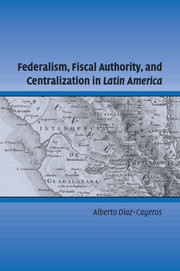Book contents
- Frontmatter
- Contents
- List of Figures
- List of Tables
- Preface
- Federalism, Fiscal Authority, and Centralization in Latin America
- 1 FEDERALISM, PARTY HEGEMONY, AND THE CENTRALIZATION OF FISCAL AUTHORITY
- Part I Fiscal Centralization in Mexico
- Part II Centralization and Revenue-Sharing in the Latin American Federations
- 6 VENEZUELA: UNITARIANISM IN DISGUISE
- 7 ARGENTINA: REGIME CHANGE AND FRAGILE CREDIBILITY
- 8 BRAZIL: THE RETENTION OF FISCAL AUTHORITY
- 9 CONCLUSION: STATE-BUILDING, POLITICAL INSTITUTIONS, AND FISCAL AUTHORITY
- References
- Index
- Titles in the Series
6 - VENEZUELA: UNITARIANISM IN DISGUISE
Published online by Cambridge University Press: 08 January 2010
- Frontmatter
- Contents
- List of Figures
- List of Tables
- Preface
- Federalism, Fiscal Authority, and Centralization in Latin America
- 1 FEDERALISM, PARTY HEGEMONY, AND THE CENTRALIZATION OF FISCAL AUTHORITY
- Part I Fiscal Centralization in Mexico
- Part II Centralization and Revenue-Sharing in the Latin American Federations
- 6 VENEZUELA: UNITARIANISM IN DISGUISE
- 7 ARGENTINA: REGIME CHANGE AND FRAGILE CREDIBILITY
- 8 BRAZIL: THE RETENTION OF FISCAL AUTHORITY
- 9 CONCLUSION: STATE-BUILDING, POLITICAL INSTITUTIONS, AND FISCAL AUTHORITY
- References
- Index
- Titles in the Series
Summary
The Abdication of Fiscal Authority
Venezuela is the most centralized of the Latin American federations and was the first to strike a centralized fiscal bargain. To a large extent, the centralized fiscal bargain in Venezuela involved the abdication by the states of all tax authority and the virtual abandonment of federalism. Venezuelan governors were appointed rather than elected in each state jurisdiction. The lack of strong state representation and power meant that the federal government could avoid complying with promised transfers to the states. Such an arrangement was only viable because the federal government had massive revenue from oil.
As the country established a democracy in the second half of the 20th century, compliance with revenue-sharing improved. The democratic governments that emerged from a compromise reached in 1958, the so-called Pacto de Punto Fijo, were able to compromise for the peaceful alternation in political power and respect partisan electoral strongholds in the states. Governors remained unelected, and the system was not highly responsive to territorial interests. Thus, regionalism in Venezuela became relatively unimportant by the second half of the 20th century. Most of the regional differences in political attitudes could be subsumed under a rural–urban cleavage (Baloyra and Martz, 1979:87). However, federalism retained a residual character that was not eliminated by the modernization forces. Federalism reemerged after 1989 with the process of decentralization and the reform that allowed for the direct election of governors.
- Type
- Chapter
- Information
- Publisher: Cambridge University PressPrint publication year: 2006



